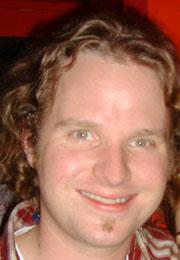|
|
| Writer's Desk |
|
 A great flick for the eve of nuclear destruction
A great flick for the eve of nuclear destruction
By Matt Stoulil
It was by chance that I popped "The Day After" into the DVD player last week. We had just dropped our digital cable subscription cold turkey, and I needed a small screen fix on a Thursday night. Thumbing through a pile of movies a new roommate had brought with him, I chose "The Day After" over "Smokey and the Bandit," opting for something with a little substance -- nuclear fallout in the Heartland. So in went the disc and out came the chips and salsa. I had heard about this movie, mostly because it was filmed here in NCR's backyard of Lawrence, Kan., and Kansas City, Mo., where I've lived since I moved here for college. Shot in the early 1980s, "The Day After" is a story of a few days in the life of people around Kansas City as Russia and the Western world resolve tensions by launching nuclear attacks.
It is at this point in my viewing -- not long before Russia peppers the region with nuclear warheads -- that I realize, "My God, this is a movie about nuclear destruction that takes place in MY city!" Not in East Asia, not in the Middle East or the Subcontinent, but in KANSAS CITY.
This was quite a flick to watch on the eve of the 60th anniversary of the bombing of Hiroshima, and I think about it again today, the anniversary of the Nagasaki bombing. It's hard to personalize a nuclear disaster of the magnitude of Hiroshima and Nagasaki, but watching a movie that depicts what it might be like if the city in which one lives were hit brings it all home. It makes me wonder how any civilized nation could do that to another nation. The depiction of the radioactive fallout was pretty gruesome in the movie, but it was just a movie. Hiroshima was not a movie. I don't claim to understand all the issues involved, and I don't doubt making the decision to drop A-bombs was terribly upsetting for Harry S. Truman (a son of Kansas City might I add) and the other leaders of our country back then. But no matter how I look at it, its hard for me to reconcile the thousands of casualties and after effects of the bombs that were dropped so many years ago and so many miles away from Kansas City. Can we as a human community avoid more nuclear warfare? Can we Americans, who hold the most nuclear firepower, come out of a nuclear conflict unscathed? Answers to these questions are unknowable, but one thing is certain: whoever gets hit, we will all be affected. If we as a world we can't resolve our problems without mass destruction, then we are all doomed. Matt Stoulil is an NCR staff member. His e-mail address is mstoulil@natcath.org. |
|||||||||
| Copyright © 2005 The National Catholic Reporter Publishing Company, 115 E. Armour Blvd., Kansas City, MO 64111 TEL: 1-816-531-0538 FAX: 1-816-968-2280 |